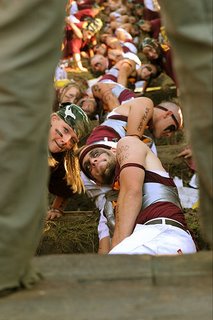Social Loafing
 There were unexpected large numbers of people in the room for my 2 day mediation last week with some suprising consequences.
There were unexpected large numbers of people in the room for my 2 day mediation last week with some suprising consequences.Both organizations had difficulty identifying who would be attending. I pondered this briefly at intake, but if it was a flag I missed it.
Both groups appeared to have unusually flat hierarchies.
As we got under way, it became clear no one in either group was willing to take the lead and be the decision maker. Even in private, there was no clear chain of command or even active consensus seeking in either room.
To me the groups appeared unmotivated, although individually there appeared to be strong views (mostly in furtive corridor discussions) but they seemed to get lost as soon as the group reformed.
Individuals actively sought anonymity within the group and diffused responsibility where they could, even when this mediator named people when asking questions that would normally elicit progress.
So what was going on?
Was it like me at my youngster's school sports the other weekend when we had the dads' 'tug of war' where I leaned lamely on the rope and let the other 40 fathers do the work - no one noticed did they?... back in 1913 Max Ringelmann did...our side lost.
Well, it turns out in both situations we had some loafers/loungers/do-nothings/slackers and wastrels...
You see, social loafing is an interesting phenomenon where people make less effort to achieve a goal when they work in a group than when they work alone.
This is one of the main reasons that groups sometimes perform less than the combined performance of their members working as individuals.
What we know about social loafing so far;
What we know about social loafing so far;
1. The more people, the more at risk the group
2. It seems to be a Western thing
3. To avoid loafing, as a mediator you may consider;
- everyone in a group knows that they can easily be evaluated by others - so you might set up a kind of debrief of the joint session in the private session process
- address players directly, so they have nowhere to hide
- dividing things up into individual bite size tasks, effectively avoiding group work where you can
- calling the elephant in the room may help, 'ok, why aren't we getting much traction here...' and have the group sort itself out
This stuff seems interesting and future posts will look at the related topics of;
deindividuation -the process by which components of an individual are integrated into a more indivisible whole, and
social facilitation -the increased likelihood of an individual performing tasks when in the company of others, shown to be strongest among those who are most concerned about the opinions of others, and when the individual is being watched by someone they do not know.





No comments:
Post a Comment